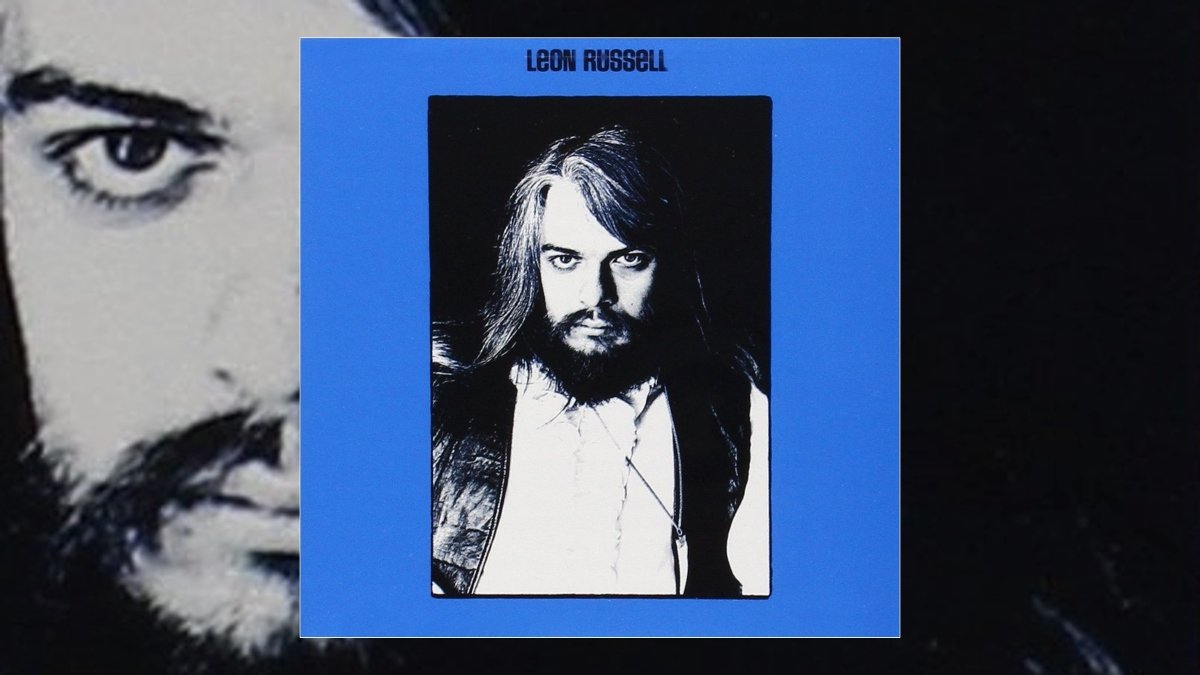Happy 55th Anniversary to Leon Russell’s eponymous debut album Leon Russell, originally released March 23, 1970.
The back cover of Leon Russell's debut solo album features a photograph of the Master of Space and Time facing the camera while casually seated in a wooden chair that's turned backwards. A cool look of supreme confidence peeks out from under a top hat with part of the brim turned up—the absolute coolest anyone's ever looked in a top hat, with apologies to Abe Lincoln, Slash, and Willy Wonka.
By 1970, Leon Russell Bridges had every right to feel cool and confident. He had already amassed a resume in a short ten years that would be the envy of anyone's entire career. He played on hits by The Ronettes, The Crystals, Glen Campbell, Gary Lewis & The Playboys, Frank Sinatra ("Strangers in the Night"), and many others. He joined Delaney and Bonnie and Friends, then teamed up with Joe Cocker who had a hit with Russell's "Delta Lady" in 1969, ultimately inspiring them to organize and hit the road as the Mad Dogs and Englishmen tour throughout 1970.
Before they hit the road, Russell gathered all of his friends—basically anyone who was anyone in the 1969-1970 rock world—and recorded his self-titled debut solo album. Recording was done in London at Olympic Studios, in Memphis at Ardent, and in several locations in LA. The sound on Leon Russell is that of celebration—of a communal celebration. There's nothing forced; there's no pretension, despite the roster of world-class musicians on board. And world-class they were.
Three-fifths of The Rolling Stones, half of the Beatles, Eric Clapton, Steve Winwood, Delaney and Bonnie Bramlett, Merry Clayton, Klaus Voorman, and Joe Cocker all contribute. Yet unlike the ego-stroking guest appearances that were commonplace on albums in the 1980s and beyond, the musicians involved here never get in the way of the star of the show. Make no mistake, Leon Russell dominates Leon Russell. It's all his show. You may hear a signature lick here and there from, say, Clapton (on "Prince of Peace"), but the guests never detract or distract, they merely enhance the overall vibe.
Starting a rock album with a ballad has always been a risky move, but a debut album? Even more so. Still, Russell softly opens not with a bang, but a seduction: the incomparable "A Song For You." After a descending scale on the piano, Russell opens with a world-weary voice that perfectly complements the lyric: “Well, I've been so many places in my life and times / Sung a lot of songs and I've made some bad rhymes / Acted out my love in stages with ten thousand people watchin' / But we're alone now and I'm singing this song to you.”
Listen to the Album:
Coincidentally and interestingly, Elton John (who championed Russell late in his career, recorded an album with him, and basically helped him get inducted into the Rock & Roll Hall of Fame) opened his self-titled album—which was recorded around the same time as Russell's and released just a month later—with a poignant meta self-aware ballad that described the act of writing a love song within a love song, calling it "Your Song.” But I digress.
Even the ending of "A Song For You" is notable in that it doesn't really resolve itself. It's in the key of F, but Russell ends on the C. It sounds as if he is waiting for, and their future rests on, his lover's response to what he's just revealed. At the same time, it sets up the journey the rest of the album takes: a journey through rock, blues, R&B, country, folk, gospel—the sound of the best of American roots music.
That journey continues with "Dixie Lullaby." With George Harrison on guitar, Ringo Starr on drums, and co-writer Chris Stainton on keys, Russell spells out in no uncertain terms where rock and roll was born: “All the southern children like to rock and roll / The TV mamas tell you why / They got it on the boat from Africa / It's a Dixie lullaby.”
Throughout Leon Russell, the music swings, slides, stomps, rocks and rolls for sure, but it can also get down to the heart of the matter. In addition to "A Song for You," there's the bluesy, soul-drenched classic "Hummingbird" that B.B. King would record just a year later on his Indianola Mississippi Seeds album with Russell conducting. Russell gives us his version of "Delta Lady," and while his voice will never be on par with Cocker's growl, Leon's drawl carries its own singular charm.
"Prince of Peace" emphasizes the golden rule and common sense life lessons colored by Clapton's unmistakable stinging Strat. On a similar note, with Bill Wyman and Charlie Watts holding down the rhythm section on the appropriately titled "Roll Away the Stone," Leon Russell ends with the sound of pure gospel rock.
In just over a year, Russell would steal the show at the Concert for Bangladesh, just like he would for most nights on the Mad Dogs and Englishmen tour. Upstaging the likes of Harrison, Clapton and Bob Dylan is no small feat, but if anyone could do it, you know it would have to be Leon Russell.
LISTEN:
Editor's note: this anniversary tribute was originally published in 2020 and has since been edited for accuracy and timeliness.

